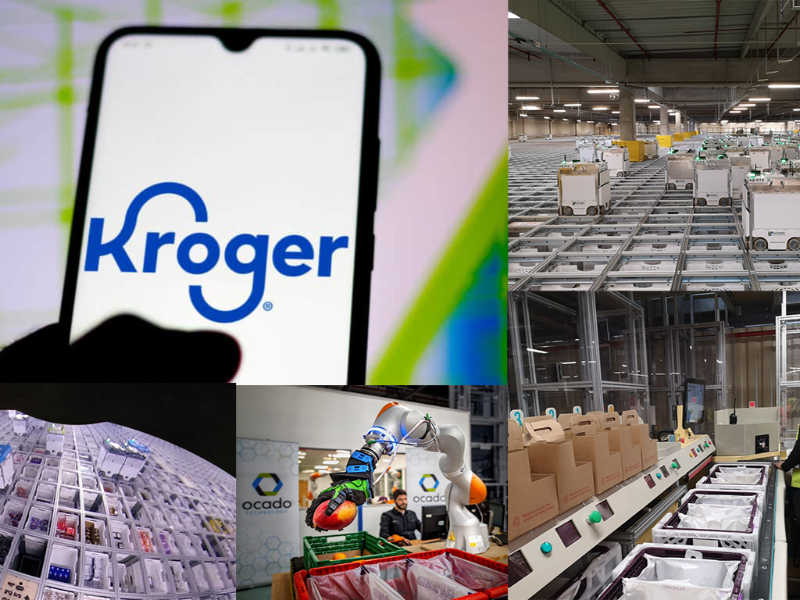- Ocado has received a significant order from its partner Kroger for an array of new automated technologies to be deployed in its warehouses.
- Kroger is set to adopt Ocado’s latest innovations across its operational network of customer fulfilment centres (CFCs) and in future CFCs.
OUR TAKE
The recent announcement by Ocado, the UK-based online supermarket and technology company, that its US partner, Kroger, has placed an order for a range of new automation technologies not only demonstrates Ocado’s leadership in robotics, but also reflects Kroger’s commitment to pursuing supply chain innovation and optimising the customer experience. The move is a significant milestone for Ocado, especially after its Canadian partner, Sobeys, suspended its project to open a fourth robotic warehouse, and the news is a shot in the arm. Through this partnership, Ocado will provide Kroger with state-of-the-art automation solutions including On-Grid Robotic Pick (OGRP) and Automated Frameload (AFL), which will help Kroger to achieve greater operational efficiencies and labour productivity across its distribution network.
–Elodie Qian, BTW reporter
What happened
Ocado, the British online supermarket and tech giant, has received a significant order from its U.S. partner Kroger for an array of new automated technologies to be deployed in its warehouses. This comes as a positive development for Ocado, following a previous announcement that its Canadian partner Sobeys had halted the launch of a fourth robotic warehouse, which had caused a drop in Ocado’s share prices.
Kroger is set to adopt Ocado’s latest innovations, including the On-Grid Robotic Pick (OGRP) and Automated Frameload (AFL), across its operational network of customer fulfilment centres (CFCs) and in future CFCs. Ocado has not disclosed the financial value of Kroger’s order.
The OGRP is a robotic arm mounted on the warehouse grid, capable of picking over 70% of a wide online grocery range at full capacity, thereby streamlining the packing process into customer bags. The AFL, on the other hand, addresses the most physically demanding task in the warehouse by automating the loading of prepared customer orders onto delivery frames, ready for dispatch.
These technological advancements are expected to enhance efficiency and labour productivity within Kroger’s delivery network. Despite a 45% year-on-year decrease in stock value, Ocado’s recent boost in annual guidance and CEO Tim Steiner’s reassurance to investors have helped to partially recover the company’s shares. Steiner emphasised that the global shift towards online shopping is ongoing, reinforcing confidence in Ocado’s business model.
Also read: Ocado says cash flow is improving despite robot warehouse delays
Also read: Ocado and Aeon to build third robotic warehouse in Japan
Why it’s important
Ocado is a B2C e-commerce site from the United Kingdom, founded in 2000 by three bankers from Goldman Sachs. Ocado sells a wide range of products including fresh food, snacks, alcohol and beverages, mother and baby/kitchen/home, etc. Ocado describes itself as ‘the world’s largest online-only grocery chain’ (World’s largest online-only grocery chain). World’s largest online-only grocery chain.)
One of the most labour-intensive aspects of a traditional e-commerce warehouse is picking. The traditional ‘Man-to-goods’ (people looking for goods) picking method requires many people to walk a lot in the warehouse area in order to walk to the appropriate warehouse to complete the picking process, which is less efficient. Ocado’s smart warehouse solution adopts the ‘Goods-to-man’ model, in which the picker does not move and the goods are automatically delivered to the person.
Kroger is the largest supermarket chain operator in the U.S. and the second largest retail group after Walmart.
The significant order from Kroger for Ocado’s automated technologies reinforces market confidence in Ocado’s business model, especially following a previous setback with Sobeys, and provides a financial boost that could counterbalance losses.
This strategic partnership with Kroger, a major U.S. supermarket chain, is set to strengthen their collaborative relationship and may pave the way for future collaborations.
Positive news of this nature could enhance investor sentiment, which is vital for the company’s stock performance and its ability to attract further investment.
Additionally, this deal expands Ocado’s global reach, opening opportunities for international partnerships. For Kroger, the implementation of these technologies could offer a competitive edge in the U.S. market by improving operational capabilities and customer service. The expected increase in labour productivity is essential for meeting the growing demand for online grocery orders while potentially reducing reliance on manual labour.

